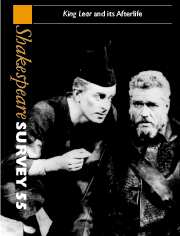Book contents
- Frontmatter
- King Lear: A Retrospect, 1980–2000
- How Shakespeare Knew King Leir
- Contracts of Love and Affection: Lear, Old Age, and Kingship
- Headgear as a Paralinguistic Signifier in King Lear
- What becomes of the broken-hearted: King Lear and the Dissociation of Sensibility
- Lear’s Afterlife
- Songs of Madness: The Lyric Afterlife of Shakespeare’s Poor Tom
- Secularizing King Lear: Shakespeare, Tate, and the Sacred
- ‘Look on her, look’: The Apotheosis of Cordelia
- Jacob Gordin’s Mirele Efros: King Lear as Jewish Mother
- ‘How fine a play was Mrs Lear’: The Case for Gordon Bottomley’s King Lear's Wife
- Some Lears
- King Lear and Endgame
- Shakespeare in Pain: Edward Bond’s Lear and the Ghosts of History
- ‘Think about Shakespeare’: King Lear on Pacific Cliffs
- Actors, Editors, and the Annotation of Shakespearian Playscripts
- Titus Andronicus: The Classical Presence
- Julius Caesar, Machiavelli, and the Uses of History
- Scepticism and Theatre in Macbeth
- Revels End, and the Gentle Body Starts
- ‘Taking just care of the impression’: Editorial Intervention in Shakespeare's Fourth Folio, 1685
- ‘A world elsewhere’: Shakespeare in South Africa
- Shakespeare Performances in England, 2001
- Professional Shakespeare Productions in the British Isles January–December 2000
- The Year's Contributions to Shakespearian Study 1 Critical Studies
- 2 Shakespeare’s Life, Times and Stage
- 3 Editions and Textual Studies (1) and (2)
- Books Received
- Index
Contracts of Love and Affection: Lear, Old Age, and Kingship
Published online by Cambridge University Press: 28 March 2007
- Frontmatter
- King Lear: A Retrospect, 1980–2000
- How Shakespeare Knew King Leir
- Contracts of Love and Affection: Lear, Old Age, and Kingship
- Headgear as a Paralinguistic Signifier in King Lear
- What becomes of the broken-hearted: King Lear and the Dissociation of Sensibility
- Lear’s Afterlife
- Songs of Madness: The Lyric Afterlife of Shakespeare’s Poor Tom
- Secularizing King Lear: Shakespeare, Tate, and the Sacred
- ‘Look on her, look’: The Apotheosis of Cordelia
- Jacob Gordin’s Mirele Efros: King Lear as Jewish Mother
- ‘How fine a play was Mrs Lear’: The Case for Gordon Bottomley’s King Lear's Wife
- Some Lears
- King Lear and Endgame
- Shakespeare in Pain: Edward Bond’s Lear and the Ghosts of History
- ‘Think about Shakespeare’: King Lear on Pacific Cliffs
- Actors, Editors, and the Annotation of Shakespearian Playscripts
- Titus Andronicus: The Classical Presence
- Julius Caesar, Machiavelli, and the Uses of History
- Scepticism and Theatre in Macbeth
- Revels End, and the Gentle Body Starts
- ‘Taking just care of the impression’: Editorial Intervention in Shakespeare's Fourth Folio, 1685
- ‘A world elsewhere’: Shakespeare in South Africa
- Shakespeare Performances in England, 2001
- Professional Shakespeare Productions in the British Isles January–December 2000
- The Year's Contributions to Shakespearian Study 1 Critical Studies
- 2 Shakespeare’s Life, Times and Stage
- 3 Editions and Textual Studies (1) and (2)
- Books Received
- Index
Summary
Imagining a legal context for Lear’s abdication and division of his kingdom plunges one into a morass of power and kinship struggles, and complicates what otherwise seems, perhaps too readily, a wholly foolish decision by him. Reading the play in this manner can help to bring out a degree of dilemma in Lear’s initial situation, and the ironies that result from his choices. The dilemma and the ironies may indeed concern not only family relations of love but the circumstances of both royal and paternal power. Moreover, there are indications that commoners in Shakespeare’s time, at least in rural areas, sometimes arranged for themselves a more modest legal version of Lear’s attempt to secure his final years while shaking off the cares of age.
A starting point, then, would be Lear’s announced purpose ‘To shake all cares and business’ either ‘of our state’ (Quarto) or ‘from our age’ (Folio).1 It is well known that kings cannot really dispose of their kingdoms to others in this way – or should not, in the thinking of Shakespeare’s time, at least by dividing the land. But commoners could reduce the cares of age by giving away their property (or by setting up a use, that is, a trust) in return for maintenance in their old age, though it is unknown how many did. There are forms in the oft-reprinted source for boilerplate legal documents (among them the preamble to Shakespeare’s will), the Symboleography of 1590 and later, by William West, of the Inner Temple.
- Type
- Chapter
- Information
- Shakespeare SurveyAn Annual Survey of Shakespeare Studies and Production, pp. 36 - 42Publisher: Cambridge University PressPrint publication year: 2002
- 1
- Cited by



